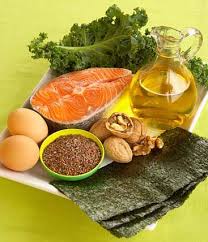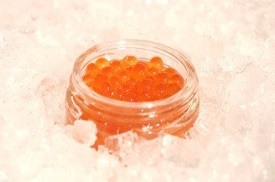Balancing Omega Fats for Health
The decades old controversy over which dietary fats are healthy has often been clouded by commercial interests. Unfortunately this has caused an imbalance of fatty acids that has compromised the health of many people. This article will give you some information to help you make some wise choices for good health.
been clouded by commercial interests. Unfortunately this has caused an imbalance of fatty acids that has compromised the health of many people. This article will give you some information to help you make some wise choices for good health.
Omega 3, 6 and 9
All fats and oils are made of a collection of fatty acid molecules. There are many types of fatty acids present in fats, each with their own properties. Your body will make and convert fatty acids as the body needs them. This includes ‘heart healthy’ Oleic Acid (Omega 9) which is the predominant fatty acid in extra virgin olive oil. However there are two fatty acids that must be supplied from dietary sources since the body is unable to make them. These essential fatty acids (EFAs) are Linoleic Acid (Omega 6) and Alpha-Linolenic Acid (Omega 3). Below are some common food sources for each of the Omegas.
Omega 9 (Oleic acid)
- Vegetable sources that are considered high in Omega 9:
- Olive oil
- Avocados
- Nuts such as cashews and macadamia
- Hybrid safflower and sunflower oils (best to avoid unless natural expeller pressed)
- Canola oil (best to avoid due to GMOs, and easily damaged in processing)
- Animal sources that are considered high in Omega 9:
- Chicken fat
- Goose fat
- Lard
Omega 6 Linoleic acid (LA)
- Vegetable sources that are considered high in Omega 6:
- Vegetable oils, such as soybean, corn, cottonseed, peanut, safflower and sunflower
- Hydrogenated and partially hydrogenated vegetable oils (best to avoid these damaged fats)
- Animal sources that are considered high in Omega 6:
- Factory farmed animals
Omega 3 Alpha-Linolenic acid (ALA)
- Nut and seed sources that are considered high in Omega 3:
- Flaxseeds
- Walnuts
- Animal sources of Omega 3:
- Pastured chicken
- Grass fed dairy and beef
- Cold water fish and oils
EFAs - it’s all about balance
 With the commercialization of refined vegetable oils, there was a dramatic shift away from healthy traditional fats. Unfortunately this has upset the balance needed by the body in favor of Omega 6. Although the ideal Omega 3 to Omega 6 ratio is not known, it is estimated to be around 1:2. The SAD (Standard American Diet) ratio is more like 1:20 or even 1:25!
With the commercialization of refined vegetable oils, there was a dramatic shift away from healthy traditional fats. Unfortunately this has upset the balance needed by the body in favor of Omega 6. Although the ideal Omega 3 to Omega 6 ratio is not known, it is estimated to be around 1:2. The SAD (Standard American Diet) ratio is more like 1:20 or even 1:25!
Why is this ratio so important? Omega 6 tends to be pro-inflammatory, whereas Omega 3 tends to be anti-inflammatory. Controlling inflammation is often the key to better health.
Animal, Vegetable, Mineral
Flaxseed has gained much popularity as a good source of Omega 3 fatty acid. However, there’s the important issue of converting Omega 3 into the two fatty acids EPA and DHA. EPA plays a role in cardiovascular disease prevention, while DHA is necessary for the brain and nerves. The process of conversion involves two enzymes; first is delta-6 desaturase, and then down line is delta-5 desaturase. Unfortunately these enzymes do not function well in many people, so only a small amount is converted, upsetting the inflammatory balance.
You can increase the activity of desaturase enzymes with sufficient amounts of vitamin C, B vitamins, and the minerals magnesium and zinc.
Including more wild-caught cold water fish like salmon, halibut and tuna in your diet ensures a more direct source of EPA and DHA.
A very traditional source of Omega 3
Fish eggs have been considered a sacred food since ancient times. Ikura, or salmon caviar, is a wise choice of Omega 3 fatty acid, including being a direct source of the brain-building fatty acid DHA. In fact a one ounce serving contains an average of 1,800mg of Omega 3! It also packs the fat soluble vitamins A, D, K2 (Activator X) and E.
or salmon caviar, is a wise choice of Omega 3 fatty acid, including being a direct source of the brain-building fatty acid DHA. In fact a one ounce serving contains an average of 1,800mg of Omega 3! It also packs the fat soluble vitamins A, D, K2 (Activator X) and E.
It’s easy to add nutrient dense salmon caviar to your regular diet, and it’s delicious too! Perfect for making your own sushi, garnishing deviled eggs, or enjoying with cheese and crackers.
Disclaimer: These statements have not been evaluated by the Food and Drug Administration. These products are not intended to diagnose, treat, cure, or prevent any disease.
Information provided in this article is not designed to and does not provide medical advice, professional diagnosis, opinion, treatment, or services to you or to any other individual. This is general information for educational purposes only. The information provided is not a substitute for medical or professional care, and you should not use the information in place of a visit, call, consultation, or the advice of your physician or other healthcare provider. Wise Choice Marketing Inc is not liable or responsible for any advice, course of treatment, diagnosis, or any other information, services, or product you obtain through Wise Choice Marketing Inc.


 Loading... Please wait...
Loading... Please wait...













